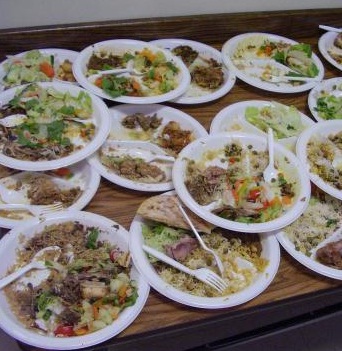
Aug 29 2010
Turkey – When the evening call to prayer rang out as I went to board the tram the other night, the platform attendant called out to me, stepping out of his booth to offer me a date — the traditional food used to break the fast during Ramadan. Onboard, a man carried a large bottle of water and a plastic cup down the aisle, offering sips to fellow Muslims who had been abstaining from food or drink since before sunrise. In the historical center of the city, families brought pots of tea, fresh-baked bread, and home-cooked dishes to eat in the shadow of the area’s great mosque.
These modest fast-breaking practices, however, are increasingly being supplanted by lavish meals that many say dishonor the spirit of the Muslim holy month — and create an immense amount of waste.
According to a recent report in The National, some 500 tons of food are thrown away each year in the United Arab Emirates during Ramadan. In response, the Environment Agency of Abu Dhabi (EAD) has launched a “Think Before You Waste” campaign and is enlisting religious leaders to get the message across. The General Authority of Islamic Affairs and Charitable Endowments is “communicating with imams to ensure that the message to be moderate with food is part of the first Friday prayer of Ramadan.”
Unintended Consequences of Charity
Though the paper notes that food waste is common to all wealthy nations, the problem has become compounded in the Islamic world by some well-intentioned cultural practices. “Having plentiful food for guests, and anyone who might ask for it, is part of the generosity expected of Muslims during Ramadan,” a time when the performing of charitable acts — one of the pillars of Islam all year round — is particularly honored. Municipalities in Turkey, for example, provide free iftar, or fast-breaking meals, to the poor.
“Culturally, there is much emphasis on providing bountiful meals in celebration of this special month, but the impact of the wasted food is not really considered,” said Majid al Mansouri, EAD’s secretary general. “A simple way to reduce food waste is to cook less in the first place, or to think twice before piling up one’s plate at the iftar buffet.”
In addition to the environmental impact, wastefulness, many say, is also against the tenets of Islam and the “true meaning” of Ramadan. The EAD campaign, The National writes, “also reminds the public that the Quran tells Muslims to avoid waste, pointing to a passage that says ‘eat and drink, but be not excessive. Indeed, he likes not those who commit excess.'”
A ‘Ramadan Compact’ to Use Less
Echoing calls from Turkey’s top religious official for more spiritual contemplation during Ramadan and a stepping back from the hectic pace of modern life, some Muslims have expanded their month-long abstention from food and drink during daylight hours to “fast” from buying things as well. Some members of the “Ramadan Compact” also cut down on travel or media consumption to “detox their increasingly cluttered lives” and create more space in which to reassess their faith, Green Prophet reports:
The Ramadan Compact site explains that the month of Ramadan is the perfect time to take up this challenge: “take the barakah (blessing) of Ramadan to be thankful for the blessings in our lives, be more mindful of our actions and their environmental impact, and reduce material consumption.”
That’s right in line with the teachings of a growing number of Islamic scholars who believe that damaging the environment through actions like littering “goes against one of the most important tenets of Islam: doing good for others,” The National reports in a separate story.
“Grand Mufti, Dr Ali Ahmed Mashael, said that another basic idea in Islam was that humans were custodians of the Earth,” the paper wrote. “This concept, known to scholars as ‘khilafah,’ came with a responsibility for humans who needed to be compassionate to other creatures and to use resources carefully.”






